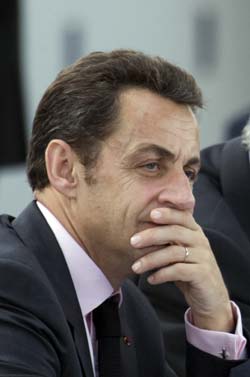Chinese people do not want French President Nicolas Sarkozy's to attend the opening ceremony of the Beijing Olympics, according to the results of a survey published on Wednesday.
 France's President Nicolas Sarkozy attends a meeting with local businessmen in Limoges June 26, 2008. [Agencies]
France's President Nicolas Sarkozy attends a meeting with local businessmen in Limoges June 26, 2008. [Agencies] |
The online poll conducted by Sina.com, was held in response to Sarkozy's threat to boycott the ceremony. He said on Monday that his attendance will depend on the progress of the latest talks between the Chinese government and the private representatives of the Dalai Lama.
Sarkozy said he will give his answer next week, during the G8 Summit in Japan.
In the survey, 88 percent of respondents said they viewed Sarkozy's remarks as "extremely unfriendly", while an equivalent proportion said they do not welcome his presence at the opening ceremony.
More than 100,000 people have so far taken part in the poll, which is ongoing, Sina.com claimed.
On Monday, the government and the Dalai Lama's representatives held a second round of talks, which has drawn wide attention from the international community.
Wu Yikang, chairman of the Shanghai Institute of European Studies, said Sarkozy's inconsistency regarding China is not up to the standard of a thoughtful and responsible statesman.
"Sarkozy's gesture of setting conditions for his attendance at the Beijing Olympics is an unfriendly move toward China. It shows his immaturity and carelessness as a politician," Wu said in an interview with the Beijing-based Global Times.
"The Chinese government will certainly not yield to his move," Wu said.
During a visit to China last year, during which the two countries signed business deals worth billions of euros, Sarkozy said he wanted to "book a seat" for the Beijing Olympics.
But after the March riots in Lhasa, the French leader said he had not ruled out the possibility of boycotting the Games.
"Some people are acting as if China is begging them to attend the Games," Wu said.
"But no one can achieve anything positive by playing the Olympic card or by linking the Games to politics."